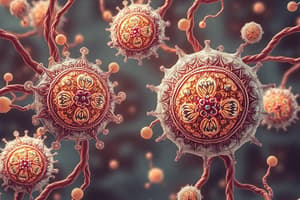Podcast
Questions and Answers
What is the primary function of stem cells?
What is the primary function of stem cells?
- To provide nutrition to specialized cells
- To produce hormones for growth
- To differentiate into specialized cell types (correct)
- To protect the body from infections
What is one major ethical concern associated with the use of embryonic stem cells?
What is one major ethical concern associated with the use of embryonic stem cells?
- The high cost of stem cell treatment
- The long duration of stem cell therapy
- The destruction of embryos during the process (correct)
- The need for a wide variety of donors
What is one potential risk associated with stem cell therapies?
What is one potential risk associated with stem cell therapies?
- Lack of consent from donors
- Decrease in genetic diversity
- Increased organ donation requirements
- Invasiveness and discomfort during procedures (correct)
Which of the following is a possible benefit of cell-based therapies?
Which of the following is a possible benefit of cell-based therapies?
What issue arises from storing genetic information in stem cell research?
What issue arises from storing genetic information in stem cell research?
Stem cells are specialised cells that cannot differentiate into other cell types.
Stem cells are specialised cells that cannot differentiate into other cell types.
Embryonic stem cells are derived from human embryos 3-5 days after fertilisation.
Embryonic stem cells are derived from human embryos 3-5 days after fertilisation.
Cell-based therapies can potentially eliminate the need for organ transplants.
Cell-based therapies can potentially eliminate the need for organ transplants.
The use of embryonic stem cells raises no ethical concerns.
The use of embryonic stem cells raises no ethical concerns.
Stem cell treatments are universally accessible and affordable for everyone.
Stem cell treatments are universally accessible and affordable for everyone.
Flashcards are hidden until you start studying
Study Notes
Stem Cells
- Stem cells are undifferentiated cells that can become many types of cells
- Differentiation refers to an unspecialized cell taking on the characteristics of a specialized cell, such as heart, liver, or muscle cells.
- Embryonic stem cells are extracted from embryos 3-5 days after fertilization.
Cell-Based Therapies
- Cell-based therapies use stem cells to repair or replace damaged cells or tissues.
- Stem cell therapies have many potential benefits, such as treatment for diabetes, heart disease, and skin grafts.
- Cell-based therapies could reduce the need for organ transplants and donors.
Ethical Considerations
- Using embryonic stem cells is controversial as it involves destroying embryos, raising concerns about the value of life.
- Donor consent is a significant ethical issue.
Privacy Concerns
- Stem cell research involves storing genetic information, which could be misused or leaked, compromising privacy and potentially leading to discrimination.
Access Equity
- Stem cell treatments are costly and not equally accessible to everyone, with disparities in access between different regions.
Procedure Risks
- Some stem cell procedures are invasive and involve discomfort with potential long-term effects that are not fully understood.
Freedom of Choice Issues
- There may be pressure to donate stem cells, and patients may not fully understand the risks and benefits due to the complex nature of the treatments.
Stem Cells
- Stem cells are unspecialised cells that can differentiate into various cell types.
- Differentiation is the process by which an unspecialised cell develops into a specialised one, such as heart, liver, or muscle cells.
- Embryonic stem cells are extracted from human embryos between 3-5 days after fertilisation.
Stem Cell Therapies
- Cell-based therapies involve inducing stem cells to differentiate into specific cell types to repair damaged or destroyed cells and tissues.
- These therapies hold potential for treating diseases like diabetes and heart disease, as well as for skin grafts and potentially reducing the need for organ transplants.
Ethical Considerations
- Using embryonic stem cells is controversial, as it involves the destruction of embryos, raising concerns about the value of life.
- Obtaining consent from donors can pose ethical challenges.
Privacy Concerns
- Stem cell research involves storing genetic information, which can lead to privacy risks and potential misuse or leakage, potentially resulting in discrimination.
Equity of Access
- Stem cell treatments are expensive and not readily available to everyone, leading to unequal access for people in different regions.
Invasiveness and Potential Risks
- Some stem cell procedures are invasive, risky, and may cause discomfort.
- The long-term effects of stem cell therapies are not yet fully understood.
Freedom of Choice
- There may be pressure to donate stem cells.
- The complexity of stem cell treatments can make it challenging for patients to fully understand the risks and benefits.
Studying That Suits You
Use AI to generate personalized quizzes and flashcards to suit your learning preferences.




